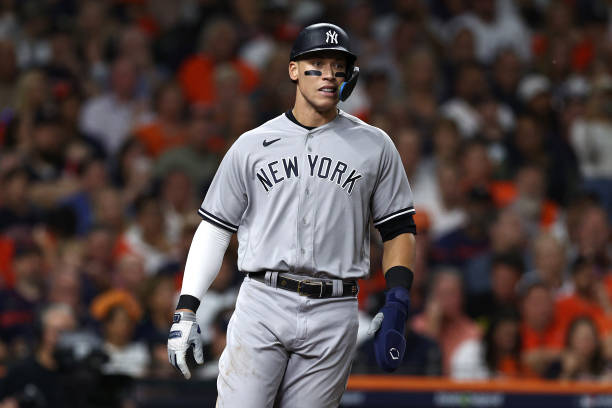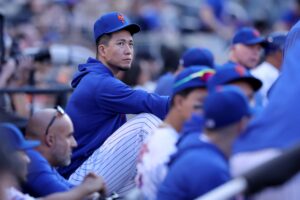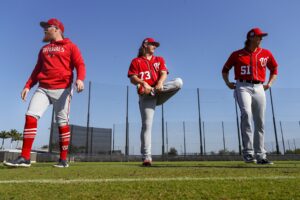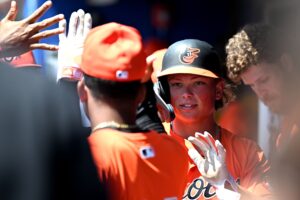The postseason hopes of the New York Yankees came crashing down in the blink of an eye last week. After a tough ALDS against the Cleveland Guardians, the Yankees were swept by the Houston Astros in four games. The team’s World Series drought now stretches to 13 seasons. In that time, New York has not even appeared in the Fall Classic.
While the Yankees were heavy underdogs in the series, the relatively lifeless showing comes as a surprise. After all, the Bombers had seen Houston in the ALCS twice before, losing in seven games in 2017, and six games in 2019. With that experience facing the Astros, and an improved pitching staff compared to those years, the team appeared well-equipped to give the Astros another tough fight. But thanks to a few factors, particularly a hapless offense, the series was over in a breeze. Here’s a look at what went wrong for the Yankees against Houston, as well as deeper issues that set them up to fail in October.
Yankees Swept by Astros: What Went Wrong
Offense
The Yankees’ offense (or lack thereof) was the main contributor to their downfall in the ALCS. Through the first three games, New York scored a total of four runs. For the series, they hit .162 as a team with a .502 OPS. Those numbers will rarely be good enough to challenge any team, let alone the best team in the American League. Notable Yankees who struggled against Houston pitching include Aaron Judge (1-for-16, four strikeouts, no extra-base hits), Josh Donaldson (1-for-13, 10 strikeouts), Matt Carpenter (1-for-10, seven strikeouts), and Oswaldo Cabrera (0-for-9, one walk, two strikeouts). Notably, the Yankees did not get a single hit from the catcher position in the series. Jose Trevino and Kyle Higashioka combined to go 0-for-14, striking out five times.
The strikeout gulf between the two teams was massive, with the Astros striking out 25 times in four games and the Yankees doubling them up with 50. A particularly stark example of the Yankees’ strikeout problem was Game One. The Astros struck out twice at the plate that night, but their staff fanned 17 Yankees hitters. It was the largest strikeout gap between two teams in a single postseason game. New York was unable to mount many offensive threats in the series. By generating so few baserunners, they made it so the Astros staff rarely had to deal with high-leverage innings. It was a vicious cycle leading to an offensive shutdown.
The only Yankees who performed at the plate were Harrison Bader (.400 BA, two homers, 1.271 OPS), Anthony Rizzo (3-for-12, one homer, one double, 1.021 OPS), Giancarlo Stanton (4-for-16, two doubles), and Isiah Kiner-Falefa (2-for-7, double, .714 OPS). Their efforts alone were not enough for the team to stay competitive.
Extra Outs Lead to Disaster
Despite the Yankees being a great defensive team overall this year (.987 fielding percentage, second in the AL), they made several defensive miscues in the ALCS, and paid the price. Their defense was shaky against Cleveland too, but their pitching helped carried them through. Against Houston’s fearsome lineup, though, the last thing a team can afford to do is give them extra outs. New York did that repeatedly, and it cost them in a big way.
In Game Three, the Yankees needed to salvage a home win to have any realistic shot of fighting back. They needed a game where they weren’t playing from behind like the first two. In the second inning, Gerrit Cole retired the first two hitters and should’ve been home free after the third. However, on a lazy fly ball from catcher Christian Vazquez, Bader and Judge had a miscommunication in the outfield. Judge ran right past Bader as the ball came down. Needless to say, Aaron Judge’s massive frame coming anywhere near you at high speed would be a major distraction. In this case, it was enough for the ball to pop out of Bader’s glove, giving the Astros new life in the inning. Sure enough, centerfielder Chas McCormick took Cole deep right afterwards, staking the Astros to a 2–0 lead, and continuing the established dynamic of the series.
In Game Four, with the Yankees leading 5–4 in the seventh inning, Gleyber Torres and Kiner-Falefa combined for a costly error on a potential double play ball. Torres tossed waywardly to IKF, who already had a rough time defensively in the Cleveland series. The ball sailed into the outfield and everyone was safe, continuing a one-out rally. Two more singles gave the Astros a 6–5 lead, which would stand, and the Yankees were swept.
Bullpen Mismanagement in Game One
The Yankees were in a position to potentially steal Game One of the ALCS, even with their struggles at the plate. They failed to cash in with runners on multiple times against Justin Verlander. However, they drove up his pitch count quickly, and he departed after six innings in a 1–1 tie. That in itself was a small victory, and the Yankees should have smelled blood after that, deploying their best arms to keep the game where it was. But instead of leaving in Jameson Taillon, who was pulled after 4 1/3 innings, or bringing in a top reliever like Jonathan Loaisiga, Aaron Boone stuck with Clarke Schmidt in the sixth inning.
Schmidt had miraculously escaped the fifth, inducing a bases-loaded double play. To that point, he had very little postseason experience, so using him afterwards for any length of time was tempting fate. Boone rode with him anyway, and he gave up two solo homers early in the seventh inning. After using Lou Trivino to finish the inning, Boone went with starter Frankie Montas for mop-up duty. Montas had struggled in his brief time with the Yankees, and hadn’t pitched since mid-September. Going to Domingo German, for example, in what was still a close game would have made more sense. Instead, Montas’ third pitch to eventual ALCS MVP Jeremy Pena sailed over the Crawford Boxes.
A 4–1 hole against the Astros that late took the air of the the Yankees’ balloon. In a position to potentially win Game One, and shift the tenor of the series, the Yankees essentially punted the game by not using their best relief options. It’s impossible to know how the game would have turned out otherwise, but the plan they went with clearly failed.
The Bigger Picture
The Yankees made several mistakes en route to being swept by the Astros. At the same time, their offense was flat and they were outplayed by a superior team. But from the Yankees’ end, the main takeaway from the 2022 ALCS stretches beyond its’ particulars. It speaks to the flaws in the Yankees’ roster construction and offensive approach, which have persisted for years. It is why, despite their regular season success and ability to win early playoff rounds, they cannot seem to get past the ALCS.
Changing Their Approach
The team has overly relied on the home run for some time now. While they had a more dynamic offense during this year’s hot start, they essentially reverted to a “home run or bust” team when October rolled around. In the postseason, a team is practically guaranteed to face one or more elite pitching staffs. This usually requires them to find different ways to score runs, like making consistent contact and stringing together baserunners. This has been the Yankees’ biggest issue for the last several postseasons. The offense flames out at the most important time, and they have a very tough time scoring without homering. It was especially clear this year, when New York had its’ best pitching staff in years, and they pitched very well in October. With a horrendous offensive showing, though, their pitching alone wasn’t enough to get them back to the World Series.
The Yankees will have to look in the mirror this offseason, and try to change their approach. Their current one is not good enough to beat Houston. A large sample size has proven that beyond any doubt. Owner Hal Steinbrenner recently announced that Boone will be back next year. He will have a similar decision to make for GM Brian Cashman, the one constant amid this 13-year drought.
Main Photo:
Embed from Getty Images
Players/Managers Mentioned:
Aaron Judge, Josh Donaldson, Matt Carpenter, Oswaldo Cabrera, Jose Trevino, Kyle Higashioka, Harrison Bader, Anthony Rizzo, Giancarlo Stanton, Isiah Kiner-Falefa, Gerrit Cole, Christian Vazquez, Chas McCormick, Gleyber Torres, Justin Verlander, Jameson Taillon, Jonathan Loaisiga, Aaron Boone, Clarke Schmidt, Lou Trivino, Frankie Montas, Domingo German, Jeremy Pena






